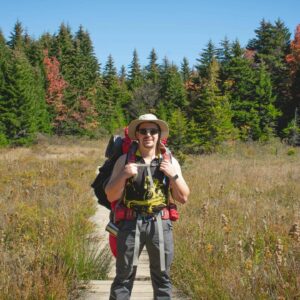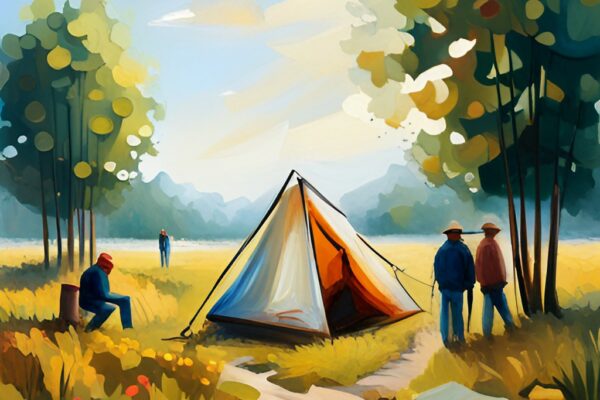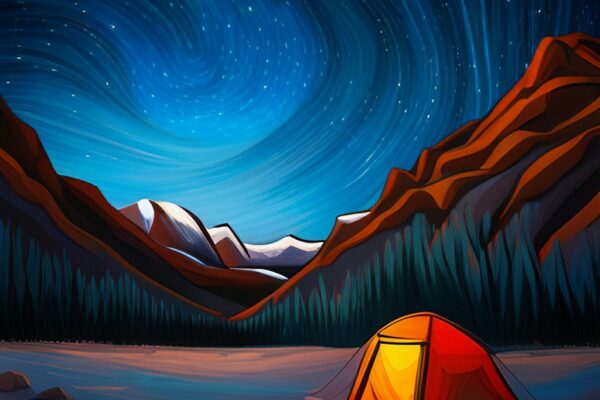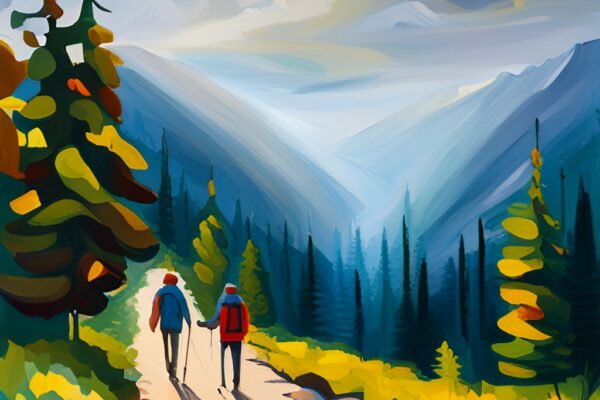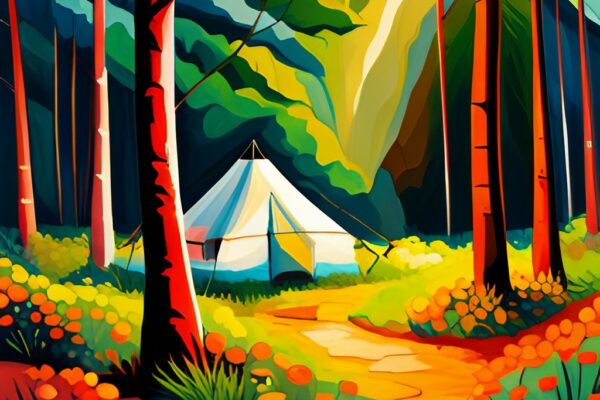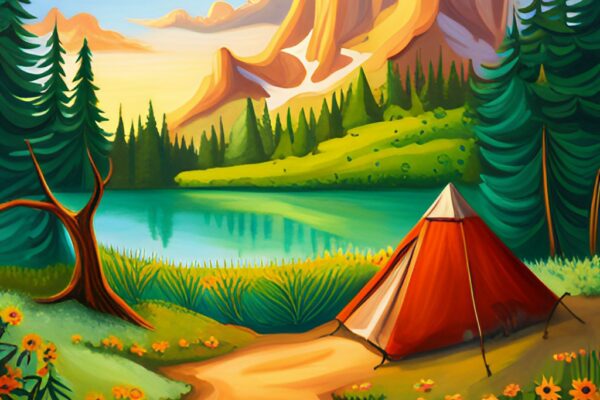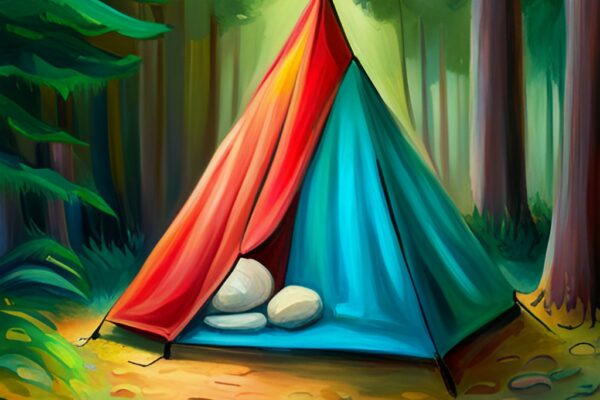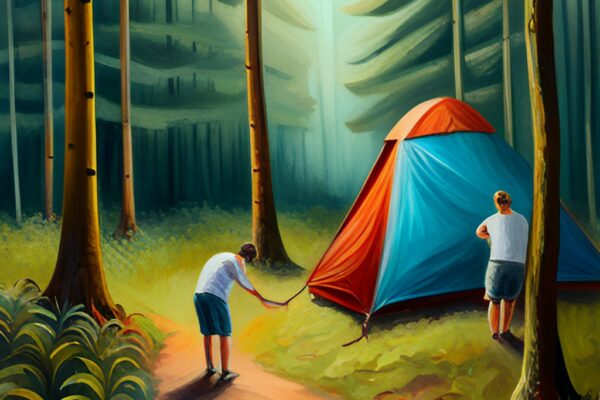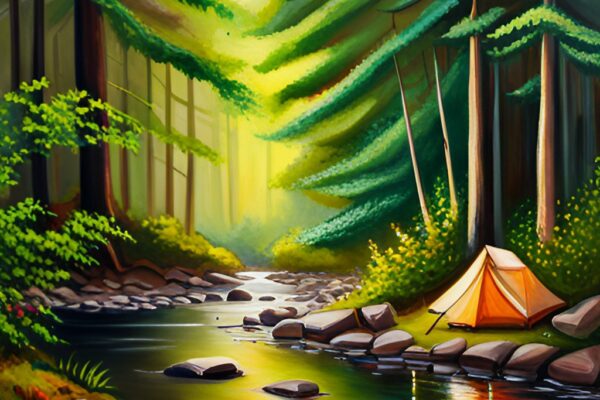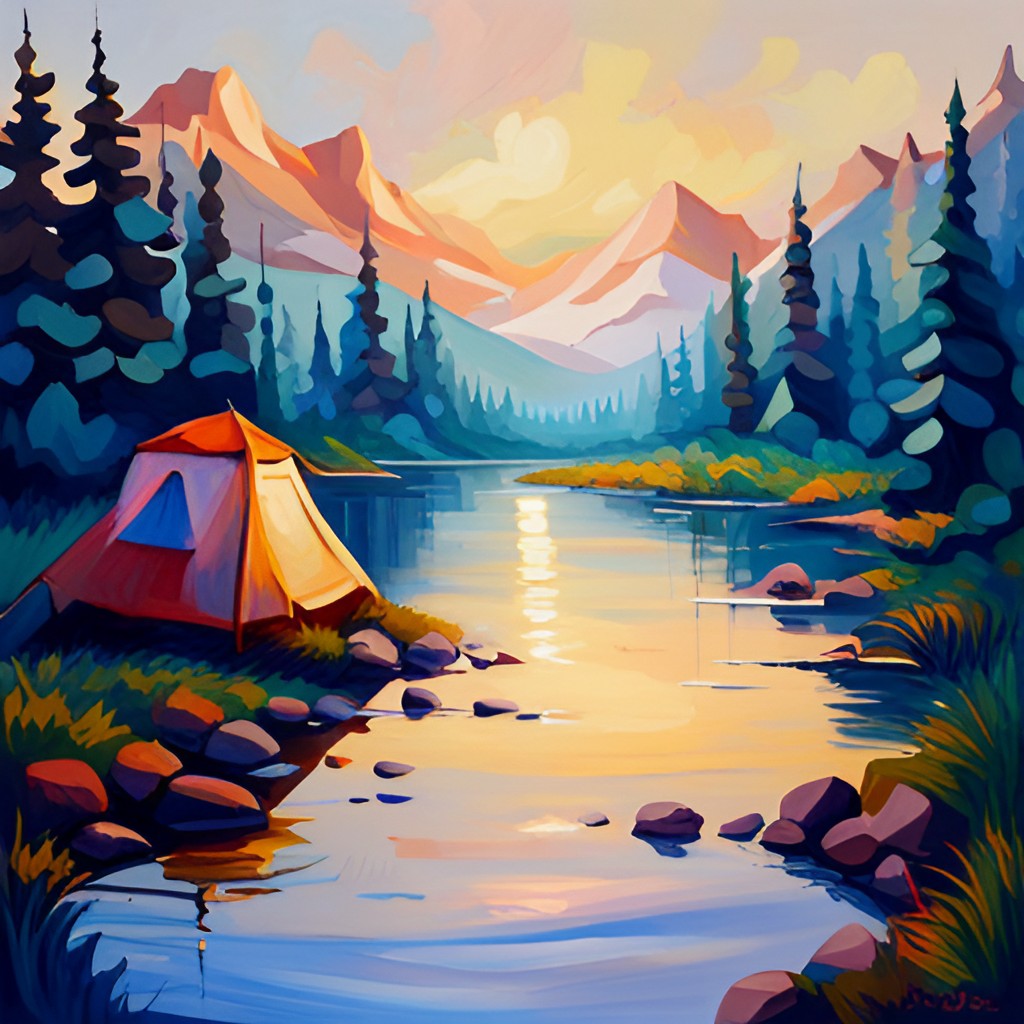
Camping is a great outdoor activity that allows people to reconnect with nature, escape the rush and bustle of daily life, and make lifelong memories. If you’re new to camping, your first outdoor excursion can be exciting and intimidating.
With the proper preparation and information, camping for beginners can be a wonderful experience.
This review covers the necessary equipment, selecting a suitable campground, safety considerations, and recommendations for successful camping for beginners. This guide will help you confidently go on your camping vacation, whether you want to relax at a public campsite or venture into the wilderness.
- The Camping Basics in a Nutshell – Unlocking the Secrets of Camping for Beginners
- 1. Equipment – The Camping Basics in a Nutshell
- 2. Campsite Selection – The Camping Basics in a Nutshell
- 3. Setting Up Camp – The Camping Basics in a Nutshell
- 4. Campfire Safety – The Camping Basics in a Nutshell
- 5. Food and Cooking – The Camping Basics in a Nutshell
- 6. Sanitation and Hygiene – The Camping Basics in a Nutshell
- 7. Safety and First Aid – The Camping Basics in a Nutshell
- 8. Leave No Trace – The Camping Basics in a Nutshell
- 9. Weather Preparedness – The Camping Basics in a Nutshell
- 10. Enjoy Outdoor Activities – The Camping Basics in a Nutshell
- Different Types of Camping – Unlocking the Secrets of Camping for Beginners
- Where Are the Ideal Campsites for Beginners? – Unlocking the Secrets of Camping for Beginners
- When is the Ideal Time to Camp? – Unlocking the Secrets of Camping for Beginners
- All of the Camping Essentials a Beginner Needs – Unlocking the Secrets of Camping for Beginners
- Tent – All of the Camping Essentials a Beginner Needs
- Sleeping Bag or Sleeping Pad – All of the Camping Essentials a Beginner Needs
- Lights (Campfire or Headlamp Lantern) – All of the Camping Essentials a Beginner Needs
- Kitchen Essentials – All of the Camping Essentials a Beginner Needs
- What to Wear While Camping – All of the Camping Essentials a Beginner Needs
- Other Things To Consider When Camping as a Beginner – All of the Camping Essentials a Beginner Needs
- Conclusion – Unlocking the Secrets of Camping for Beginners
The Camping Basics in a Nutshell – Unlocking the Secrets of Camping for Beginners
Camping is a popular outdoor activity that allows people to immerse themselves in nature and enjoy the world’s natural beauty. Understanding the camping essentials is vital to planning a weekend break or a more extended adventure to ensure a safe and pleasurable experience.
Here are some essential factors to consider:
1. Equipment – The Camping Basics in a Nutshell
Invest in necessary camping equipment such as a tent, sleeping bags, sleeping pads or air mattresses, cooking equipment, illumination, and navigation instruments. Choose camping equipment that is appropriate for the weather and terrain.
2. Campsite Selection – The Camping Basics in a Nutshell
Based on your preferences and needs, research and select a suitable campsite. Consider location, amenities, laws, accessibility, and local activities.
3. Setting Up Camp – The Camping Basics in a Nutshell
Learn to correctly set up your tent, considering ground conditions, weather protection, and camping rules. Before your camping vacation, familiarize yourself with the tent’s features and practice setting it up.
4. Campfire Safety – The Camping Basics in a Nutshell
If campfires are authorized, adhere to the safety standards. Choose a spot free of flammable things, clear the area around the fire pit, and have a water source nearby. Never leave a campfire alone; ensure it’s entirely out before leaving.
5. Food and Cooking – The Camping Basics in a Nutshell
Plan meals ahead of time and pack nonperishable foods. Depending on the campground, you can cook over a campfire, stove, or portable grill. To avoid wildlife interactions, practice adequate food storage.
6. Sanitation and Hygiene – The Camping Basics in a Nutshell
Taking toiletries, biodegradable soap, and hand sanitizer will help you maintain your hygiene and sanitation. Use proper waste disposal methods, such as packing out trash and, if available, using designated bathroom facilities.
7. Safety and First Aid – The Camping Basics in a Nutshell
Learn basic first aid practices and keep a well-stocked kit on hand. Be mindful of potential hazards, wildlife safety, and camping emergency measures.
8. Leave No Trace – The Camping Basics in a Nutshell
Adhere to the principles of Leave No Trace, which encourage responsible and sustainable camping practices. Minimize your impact on the environment by leaving the campsite clean and undisturbed.
9. Weather Preparedness – The Camping Basics in a Nutshell
Check the weather forecast before leaving, and wear proper clothing and equipment. Prepare for changing weather patterns and have a backup plan in case of severe weather.
10. Enjoy Outdoor Activities – The Camping Basics in a Nutshell
Take advantage of outdoor activities available at the campsite, such as hiking, fishing, birdwatching, or simply relaxing and enjoying the tranquility of nature.
Different Types of Camping – Unlocking the Secrets of Camping for Beginners
Several types of camping suit different preferences and degrees of outdoor experience, ranging from the ease of pitching a tent in a public campground to the thrill of trekking into the woods for backcountry camping.
Understanding the many sorts of camping can help you tailor your outdoor excursions to your desires, whether you choose comfort and convenience or solitude and self-reliance.
Campsite Camping – Different Types of Camping
Camping at a designated campground or campsite mainly constructed and equipped for camping purposes is called campsite camping. Government agencies, corporate organizations, or individual proprietors often maintain these campgrounds.
Campsite camping includes amenities such as a dedicated tent or RV site, picnic tables, fire pits or grills, toilet facilities, drinkable water, and, in some cases, showers and electricity hookups. It offers a simple and organized camping experience that allows people to enjoy the outdoors while yet having access to basic conveniences.
Camping in a campsite is popular with families, first-timers, and people who desire a more structured and accessible camping experience.
This type of camping comprises any camper who has paid for a spot on a campsite for an extended period, ranging from groups of friends to couples to huge families. A dedicated plot means you’ll have your own space and will be surrounded by other vacationers, and you’ll usually be able to park right next to your tent.
Check the rules of your selected campsite before your trip, as some will restrict the tent size you can bring, and many family parks will not accept single-sex parties.
Glamping – Different Types of Camping
Glamping, which stands for “glamorous camping,” is a camping style that blends the outdoors with lavish facilities and accommodations. Unlike traditional camping, which frequently entails roughing it in tents and sleeping bags, glamping provides a more polished and premium camping experience.
Glamping lodgings range from fully equipped safari tents to yurts, treehouses, domes, and even elegant cabins and eco-lodges.
Glamping sites are aimed to provide a luxurious and fashionable camping experience, with amenities such as actual beds, power, private bathrooms, hot showers, and, in some cases, gourmet meals or professional chefs. Spa services, Wi-Fi, and recreational activities may be available at some glamping destinations.
Glamping allows people to experience the natural beauty and tranquillity of the outdoors while enjoying opulent luxuries. It caters to people looking for a one-of-a-kind outdoor experience without sacrificing convenience or modern comforts.
Glamping is popular among couples, families, and individuals who value nature, comfort, and one-of-a-kind lodgings.
Car Camping – Different Types of Camping
Car camping, also known as vehicle camping or car-based camping, is a type of camping in which people or groups camp out of their vehicles, generally at authorized campgrounds or remote areas accessible by automobile. The car serves as both transportation and a basecamp for sleeping and storing camping supplies when car camping.
It allows campers to conveniently transport and store their camping equipment, food, and personal things, making it a practical and accessible way to enjoy the outdoors.
With a car nearby, campers can bring additional equipment and luxuries, such as larger tents, comfy sleeping arrangements, camping chairs, coolers, and cooking equipment.
Car camping is popular with families, first-time campers, and individuals who prefer a more comfortable and structured camping experience. It strikes a compromise between the ease of having a vehicle nearby and the chance to be immersed in nature. It is a versatile choice that may cater to various preferences, ranging from staying in established campgrounds with amenities to exploring more rural spots accessible by automobile.
Where Are the Ideal Campsites for Beginners? – Unlocking the Secrets of Camping for Beginners
Ideal campgrounds for beginners frequently strike a mix between accessibility, facilities, and a welcoming setting for people new to camping. Campgrounds in national and state parks are popular because they often feature well-maintained facilities, designated campsites, and helpful park rangers to provide direction. These campgrounds frequently provide amenities such as bathrooms, potable water, and picnic spaces, offering a comfortable experience for first-timers.
Private campgrounds and RV parks are also excellent choices because they frequently offer electricity hookups, showers, and planned activities. These campgrounds typically provide a more regulated and accessible camping experience, making it easier for beginners to adjust.
Another option is to look for campgrounds that provide structured beginner-friendly programs or guided camping trips where professional instructors will assist you and teach you camping skills. Lastly, the best beginner campgrounds offer a welcoming and inclusive environment, amenities, and resources to help new campers feel at ease and enjoy their first camping experience.
When is the Ideal Time to Camp? – Unlocking the Secrets of Camping for Beginners
Personal tastes, preferred activities, and geography determine the ideal time to camp. However, many campers find that spring and fall provide pleasant weather conditions. Temperatures are frequently mild during these seasons, and the likelihood of excessive heat or cold is lessened. Spring brings flower blooming and nature’s regeneration, whereas fall delivers brilliant foliage and a warm ambiance.
Summer camping is extremely popular, especially for families and individuals looking for better weather and longer daylight hours. It enables outdoor activities such as swimming, hiking, and fishing. Although, some sites may face high temperatures and increased crowding during the peak summer months.
Winter camping is ideal for more experienced campers who prefer snow sports or a peaceful winter setting. To ensure safety and comfort, specialist equipment and an understanding of cold-weather camping tactics are required.
Furthermore, examine the exact location and look for seasonal aspects that may affect camping circumstances, such as rainy seasons or insect activity. Finally, the best time to camp depends on personal preferences and the intended outdoor experience.
All of the Camping Essentials a Beginner Needs – Unlocking the Secrets of Camping for Beginners
Camping is a lot like vacationing in a rustic cabin, just without the comforts of home. Pack as if you are traveling to a place with no furniture, no running water, no kitchen appliances, and no food storage in addition to your tent. A developed campground will have plumbing and a central restroom facility within walking distance. You may expect a campsite to include a space to park your vehicle, a level area to set up your tent, and a table.
Borrowing or renting the tent, sleeping bags, and pads will limit your initial cost to a minimum. Instead of spending next to nothing on something that might not even survive through one camping trip, you can save money by doing that. If you’re ready to acquire your camping equipment, consider the following suggestions.
Tent – All of the Camping Essentials a Beginner Needs
Consider the number of people camping with you and whether or not you’ll need extra space for things like gear or dogs before settling on a specific tent style. However, remember that there is no universally accepted standard for the size of a tent per person.
We recommend the following guidelines for assessing the stated capacity of a tent: Think of it as a snug fit. If you or your regular tent partner are claustrophobic, have trouble sleeping at night, sleep better with more than average elbow room, or bring a small child or a dog, consider upgrading your tent’s capacity by one person.
Other things to consider when choosing a tent include:
- Peak height
- Tent doors
- Tent floor length
- Tent materials
- Tent poles
- Rainfly
- Ventilation
- Garage or Vestibules
- Interior pockets and loops
Sleeping Bag or Sleeping Pad – All of the Camping Essentials a Beginner Needs
Choose a sleeping bag with a lower temperature rating than the coldest nighttime temperature you anticipate where you want to camp, as you can always unzip the pack if it gets too warm. If you plan on using your backpack in the winter, it’s a good idea to research options that can withstand colder temperatures.
Remember that temperature ratings, which assume an “average sleeper,” are most helpful in comparing different bags. How you feel in the great outdoors depends on various elements, including your sleeping pad, the clothes you wear to bed, the relative humidity and wind, metabolism, and many others.
Pads are both a cushion and an insulator, crucial to a restful night’s sleep in the great outdoors. It’s easy to overlook a pad’s ability to keep you warm throughout the night in favor of its more obvious benefit—providing a quiet place to sleep. It has always been the case that factors such as humidity, wind, kind of shelter, ground conditions, clothing, and personal preferences can significantly affect how warm and comfortable you feel in the actual world compared to the tested temperature levels. However, your sleeping arrangement should be your top priority.
The sleeper’s clothing, a sleeping pad, and a sleeping bag comprise the three main parts of a sleep system.
Lights (Campfire or Headlamp Lantern) – All of the Camping Essentials a Beginner Needs
You’ll need to bring your lighting because the campsites don’t provide any. Headlamps are preferable to flashlights because they leave your hands free for other camp chores. A lantern is a great way to set the mood. A camper can buy a headlamp or lantern or build a fire (if allowed at the campsite).
Campfires are an integral aspect of the camping experience and a time-honored ritual. It’s a terrific way to stay toasty and have a place to socialize in the great outdoors. Campfires should be built only in approved fire rings or pits, and the surrounding area should be free of combustible materials.
Create an initial bed of tinder and kindling before adding larger logs. Start the fire with a lighter, matches, or other suitable means. Never leave a fire unattended, and make sure it’s entirely out before you leave the campsite, as required by campsite regulations and fire safety recommendations.
A well-constructed campfire is a source of heat and a place to tell stories, toast marshmallows, and make new friends.
When deciding between a headlamp and a lantern for camping, it’s essential to consider your demands and preferred method of camping.
A headlamp may be used in various situations and is convenient because it frees up your hands and shines light exactly where you need it. It works wonderfully for camping, cooking, and reading. A lantern, on the other hand, casts a warmer, more ambient light that may be utilized to illuminate a wider area. It’s perfect for campfires and games and provides ambient lighting for everyone.
Whether you go for a headlamp or a lantern relies on personal preference, the nature of your camping activities, and the atmosphere you hope to create.
Kitchen Essentials – All of the Camping Essentials a Beginner Needs
Kitchen necessities are necessary when camping, for making meals and for having fun. A camping stove or grill, pots and pans, a spatula and tongs, plates, bowls, and silverware are all necessities. Food storage containers, an ice chest, and cleaning materials are also necessary to preserve food quality and prevent germs from spreading.
The standard propane camp stove with two burners should do the trick. You won’t have to break the bank by making coffee and eggs in the same pot. Bring a few gasoline canisters and a lighter and test it at home to ensure you understand how it functions.
It’s possible you already have one that will do the job. Just make sure there’s enough for your perishables, a few cold ones, and enough ice to keep them out. Even though they cost more, newer coolers with more insulation help keep ice for much longer.
You must bring all your cooking and eating equipment with you. You’re welcome to scavenge in the kitchen, but please leave the expensive china at home. You’ll also need a scrubber, some biodegradable soap, a towel, and a few tiny washtubs if you don’t want to take the dishes home.
What to Wear While Camping – All of the Camping Essentials a Beginner Needs
Choosing appropriate camping attire is critical for the comfort, safety, and pleasure of the outdoor experience. Here are some things to think about when picking what to wear:
- Weather Conditions: Before camping, check the weather prediction and pack accordingly. Layering is essential for adjusting to temperature variations during the day. Pack lightweight, moisture-wicking gear for hot weather and insulating layers for cold weather. If there is a potential for rain, remember to bring rain gear.
- Activity Level: Consider the activities you intend to partake in during your camping trip. Hiking pants, moisture-wicking shirts, and robust boots are examples of comfortable, long-lasting apparel that allows for freedom of mobility. Pack footwear appropriate for various terrains and activities, such as hiking boots, water shoes, or sandals.
- Protection: Wear a hat, sunglasses, and sunscreen to protect yourself from sun exposure. Insect repellent and long-sleeved shirts and pants can help keep pests and ticks at bay. Pack a lightweight, breathable insect net for extra protection.
- Material: Choose quick-drying clothing and moisture-wicking, such as nylon or polyester. These fabrics will keep you dry and comfortable even if you sweat or get wet.
- Comfort and Functionality: When camping, comfort should take precedence over fashion. Choose loose-fitting clothing that allows for movement, and look for pieces with several pockets to store little needs easily.
- Respect Nature: Knowing the local ecosystem and any specific clothing suggestions or limits is critical when camping in some areas. In a bear country, for example, it may be prudent to avoid wearing garments with solid odors or vivid colors.
Considering these variables, you may select proper camping apparel that offers comfort and protection and enhances your outdoor experience.
Other Things To Consider When Camping as a Beginner – All of the Camping Essentials a Beginner Needs
Balancing necessities and keeping your pack light is crucial when packing camping amenities. Biodegradable soap, toothbrush, toothpaste, toilet paper, hand sanitizer, and a small towel are all essentials. Use wet wipes or dry shampoo to freshen yourself quickly if no showers are available. Pack any medications, bug repellent, and sunscreen that you may require.
Choose travel-sized containers to save weight and space. Keep toiletries in a waterproof bag or container to prevent leaks and maintain easy access. Remember to follow the Leave No Trace principles by properly disposing of rubbish and limiting your environmental impact.
Meal planning is essential when camping to ensure nutritious and pleasurable meals throughout your outdoor excursion. Begin by making a menu and a list of the ingredients required. Choose nonperishable and simple-to-prepare foods such as canned goods, dried meals, and dry snacks.
Consider everyone in your group’s dietary restrictions and preferences. Cooking tools, pots, pans, and a camping stove or grill should be brought. Preparing some meals ahead of time and storing them in resealable bags or containers will help you save time and space. Don’t forget to include condiments, spices, and cooking oil.
To reduce environmental effects, plan for proper food storage and garbage disposal. You can eat properly and enjoy your camping adventure if you plan.
Conclusion – Unlocking the Secrets of Camping for Beginners
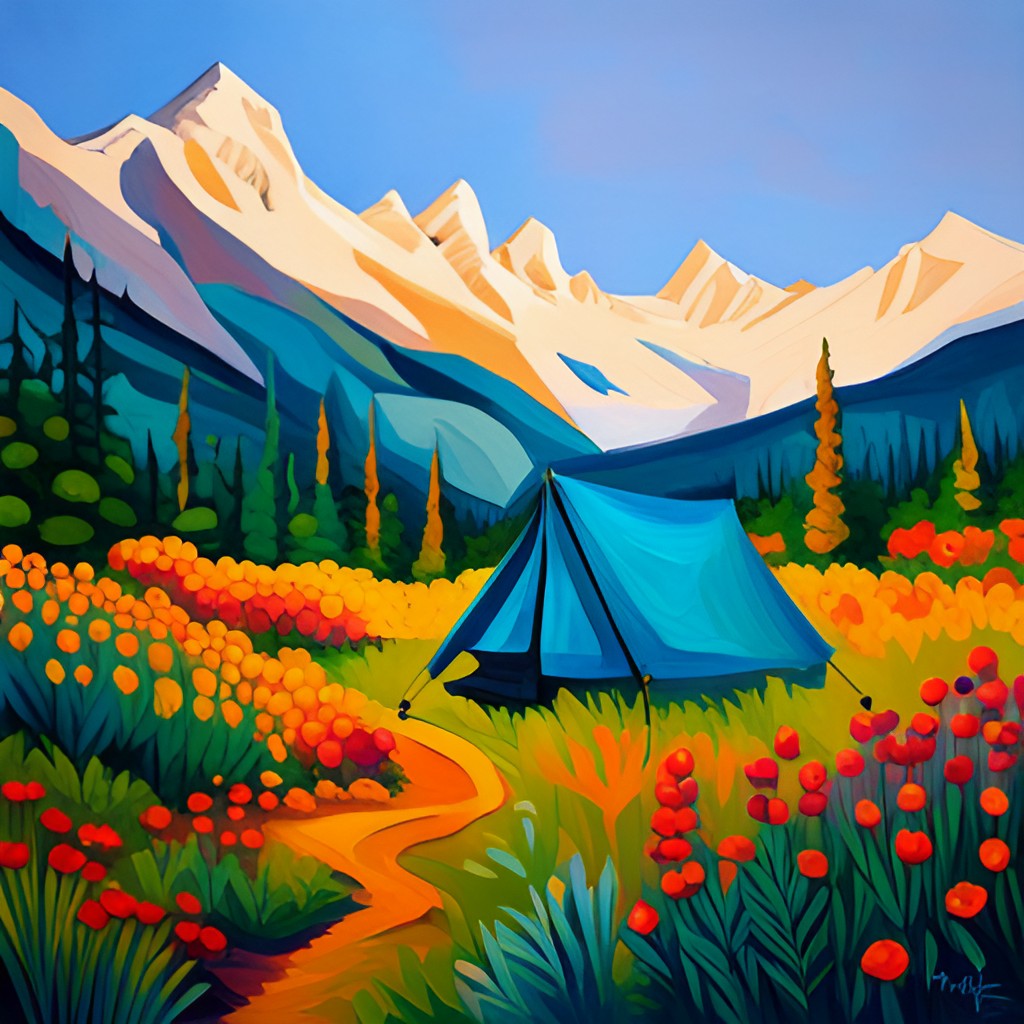
Overall, even for first-timers, camping is an enjoyable and enriching activity that provides opportunities to learn about and appreciate the natural world and to make memories with friends and family that will last a lifetime.
Beginners can have a successful outdoor experience by first learning the basics, such as how to pick the best campground, what equipment is necessary, and how to use it. Tent camping, glamping, car camping, and discovering new kinds of campgrounds show that there’s a camping approach for everyone.
Camping has several advantages, including learning new skills, spending time in nature, and making memories with friends and family. The experience allows one to take a break from their busy lives, appreciate the splendor of nature, and find peace in the simplest of settings.
So pack up your tent and sleeping bag, pick a campsite, and get ready to experience the magic of camping for the first time! Have a wonderful time outdoors!
Further Readings – Conclusion
Internal:
The Ultimate Guide To A Comfortable Camping Experience: How To Properly Set Up And Secure Your Tent
Tent Camping In All Seasons: How To Adapt Your Gear And Techniques For Different Weather Conditions
The Role Of Layering In Tent Camping: Dressing For Comfort And Weather Protection
External:
Camping for beginners: How to go camping for the first time
The Wildly-Useful Camping Tips, Tricks & Guide for Beginners

